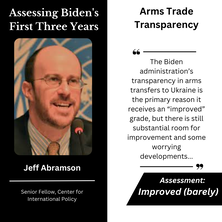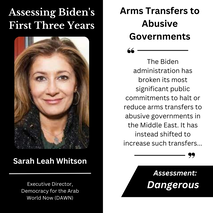Assessing Biden's First Three Years

U.S. President Joe Biden was inaugurated three years ago-- on January 20, 2021. The Forum on the Arms Trade invited members of its community, including experts and emerging experts, to examine aspects of the Biden administration's first three years. (Published January 19, 2024.)
Each assessment is individually authored and does not necessarily reflect the opinion of the expert's organization. Inclusion here does not imply agreement with or endorsement of the opinions of others. The Forum itself does not take positions.
(See assessment rubric.)
Each assessment is individually authored and does not necessarily reflect the opinion of the expert's organization. Inclusion here does not imply agreement with or endorsement of the opinions of others. The Forum itself does not take positions.
(See assessment rubric.)
IMPROVED
UNSATISFACTORY
DANGEROUS
- Arms trade transparency (barely improved) - Jeff Abramson
- Countering corruption - Colby Goodman
- Department of Defense (DoD) civilian protection policy - Madison Hunke
- Landmine policy - Jeff Meer
UNSATISFACTORY
- Arms Trade Treaty - Rachel Stohl
- Promoting global norms and U.S. values - Sarah Yager
DANGEROUS
- Presidential authority under the Arms Export Control Act to waive Congressional review - Janet Abou-Elias and Lillian Mauldin
- Cluster munitions - Mary Wareham
- Compliance with commitments on arms transfers to abusive governments - Sarah Leah Whitson

Assessment: Improved (barely)
Issue: Arms Trade Transparency
The Biden administration’s transparency in arms transfers to Ukraine is the primary reason it receives an “improved” grade, but there is still substantial room for improvement and some worrying developments, especially as relates to assistance to Israel. The contrast between the public information available about those two countries is striking and problematic. Where we have seen a revised fact sheet published with nearly every new commitment to Ukraine, nothing similar exists for military assistance to Israel. This is especially alarming given the devastation taking place in Gaza to civilians and civilian infrastructure with weapons the U.S. has provided.
The Biden administration also marginally improved transparency regarding the U.S. export of semiautomatic and related weapons, putting in place somewhat similar Congressional notification practices that existed before the Trump administration undid them by transferring lead export authority to the Commerce Department in 2020. Worryingly, the reporting on these transfers that was partially disaggregated by country in a 2021 report, no longer is in the most recent versions.
Also missing is a distinction of the size of Direct Commercial Sales that were notified to Congress found in a 2021 factsheet, but not a 2023 version – depriving the public of the tiny bit of transparency into the size of arms transfers never notified to Congress, which is clearly in the billions. The continued use of Congressional review waivers for some Foreign Military Sales as well as reliance on Direct Commercial Sales for often-controversial deals – for which there is much less public transparency – remains challenging to public arms trade transparency.
Evaluator: Jeff Abramson, Senior Fellow, Center for International Policy
Issue: Arms Trade Transparency
The Biden administration’s transparency in arms transfers to Ukraine is the primary reason it receives an “improved” grade, but there is still substantial room for improvement and some worrying developments, especially as relates to assistance to Israel. The contrast between the public information available about those two countries is striking and problematic. Where we have seen a revised fact sheet published with nearly every new commitment to Ukraine, nothing similar exists for military assistance to Israel. This is especially alarming given the devastation taking place in Gaza to civilians and civilian infrastructure with weapons the U.S. has provided.
The Biden administration also marginally improved transparency regarding the U.S. export of semiautomatic and related weapons, putting in place somewhat similar Congressional notification practices that existed before the Trump administration undid them by transferring lead export authority to the Commerce Department in 2020. Worryingly, the reporting on these transfers that was partially disaggregated by country in a 2021 report, no longer is in the most recent versions.
Also missing is a distinction of the size of Direct Commercial Sales that were notified to Congress found in a 2021 factsheet, but not a 2023 version – depriving the public of the tiny bit of transparency into the size of arms transfers never notified to Congress, which is clearly in the billions. The continued use of Congressional review waivers for some Foreign Military Sales as well as reliance on Direct Commercial Sales for often-controversial deals – for which there is much less public transparency – remains challenging to public arms trade transparency.
Evaluator: Jeff Abramson, Senior Fellow, Center for International Policy

Assessment: Improved
Topic: Countering Corruption
In February 2023, the U.S. government released its new Conventional Arms Transfer (CAT) policy, and for the first time, it provides a full acknowledgement of the role corruption plays in undermining US efforts to enhance partners’ military performance. This is a significant step forward and follows the new Countering Corruption Strategy published in December 2021. The U.S. government has now committed to assessing both the accountability mechanisms of partner security sector institutions and the risk of U.S. arms transfers fueling corruption. The effectiveness of these new provisions, however, hinges on the steps the United States takes to obtain and use information on corruption risks associated with arms transfers. So far, the U.S. government has stated that it is reviewing recipient country’s commitments to defense budget transparency and other defense policy and procurement indicators, including from TI-DS’s Government Defence Integrity (GDI) index, for government-to-government arms transfers. The US government, however, needs to tackle corruption risks in commercial arms sales to fully meet the goals of the new CAT policy and effectively combat corruption.
Evaluator: Colby Goodman, Senior Researcher, Transparency International USA and Transparency International Defence and Security
Topic: Countering Corruption
In February 2023, the U.S. government released its new Conventional Arms Transfer (CAT) policy, and for the first time, it provides a full acknowledgement of the role corruption plays in undermining US efforts to enhance partners’ military performance. This is a significant step forward and follows the new Countering Corruption Strategy published in December 2021. The U.S. government has now committed to assessing both the accountability mechanisms of partner security sector institutions and the risk of U.S. arms transfers fueling corruption. The effectiveness of these new provisions, however, hinges on the steps the United States takes to obtain and use information on corruption risks associated with arms transfers. So far, the U.S. government has stated that it is reviewing recipient country’s commitments to defense budget transparency and other defense policy and procurement indicators, including from TI-DS’s Government Defence Integrity (GDI) index, for government-to-government arms transfers. The US government, however, needs to tackle corruption risks in commercial arms sales to fully meet the goals of the new CAT policy and effectively combat corruption.
Evaluator: Colby Goodman, Senior Researcher, Transparency International USA and Transparency International Defence and Security

Assessment: Improved
Topic: Department of Defense (DoD) civilian protection policy
Explanation: The three years of the Biden administration has produced several landmark improvements in the DoD’s policies on the protection of civilians. Spurred by sustained civil society pressure and revelations concerning DoD practices around civilian casualties, Secretary of Defense Lloyd Austin mandated the development of the 2022 Civilian Harm Mitigation and Response Action Plan (CHMR-AP), a groundbreaking commitment to overhaul U.S. policy on civilian protection. In July 2023, the DoD released an updated version of the DoD Law of War Manual reflecting greater alignment with international legal standards around the presumption of civilian status in targeting, as well as additional details on feasible precautions. Most notably, the Department issued its long-awaited DoD Instruction on Civilian Harm Mitigation and Response (DoD-I) in December 2023, a policy that is the first of its kind and crystalizes numerous reforms envisioned by the CHMR-AP. The policy includes steps to prevent civilian harm, the standardization of assessments and investigations into reports of civilian harm, development of tailored responses to such harm, and the incorporation of civilian harm prevention and mitigation measures into U.S. security assistance programs.
Unfortunately, instead of putting these policies into practice with the escalation of conflict in Gaza, the Biden administration has undermined their credibility by enabling catastrophic levels of civilian harm through U.S. security assistance to Israel. To prevent the reduction of civilian protection commitments and policies to mere rhetoric, the fourth year of the Biden administration will need to take determined action to reverse course and practice what it has preached.
Evaluator: Madison Hunke, U.S. Program Officer, Center for Civilians in Conflict (CIVIC) (guest contributor)
Topic: Department of Defense (DoD) civilian protection policy
Explanation: The three years of the Biden administration has produced several landmark improvements in the DoD’s policies on the protection of civilians. Spurred by sustained civil society pressure and revelations concerning DoD practices around civilian casualties, Secretary of Defense Lloyd Austin mandated the development of the 2022 Civilian Harm Mitigation and Response Action Plan (CHMR-AP), a groundbreaking commitment to overhaul U.S. policy on civilian protection. In July 2023, the DoD released an updated version of the DoD Law of War Manual reflecting greater alignment with international legal standards around the presumption of civilian status in targeting, as well as additional details on feasible precautions. Most notably, the Department issued its long-awaited DoD Instruction on Civilian Harm Mitigation and Response (DoD-I) in December 2023, a policy that is the first of its kind and crystalizes numerous reforms envisioned by the CHMR-AP. The policy includes steps to prevent civilian harm, the standardization of assessments and investigations into reports of civilian harm, development of tailored responses to such harm, and the incorporation of civilian harm prevention and mitigation measures into U.S. security assistance programs.
Unfortunately, instead of putting these policies into practice with the escalation of conflict in Gaza, the Biden administration has undermined their credibility by enabling catastrophic levels of civilian harm through U.S. security assistance to Israel. To prevent the reduction of civilian protection commitments and policies to mere rhetoric, the fourth year of the Biden administration will need to take determined action to reverse course and practice what it has preached.
Evaluator: Madison Hunke, U.S. Program Officer, Center for Civilians in Conflict (CIVIC) (guest contributor)

Assessment: Improved
Topic: Landmine policy
Explanation: The Trump administration’s 2020 policy that would allow use of antipersonnel landmines anywhere in the world made pre-existing policy dangerous as Biden entered into office. After pledging to revise policy in 2021, the administration finally acted in 2022, when it functionally returned to the Obama-era formulation of reserving use of landmines only for the Korean peninsula and setting the goal of one day joining the Mine Ban Treaty. That is a welcome improvement but still leaves the United States at odds with 164 countries, including all its NATO allies, in envisioning a use for these indiscriminate weapons. In particular, the Administration has so far failed to make visible progress on two deliverables it had promised in 2022: reducing its stockpile to only those necessary to defend the Korean peninsula and pursuing materiel and operational solutions toward becoming compliant with the Mine Ban Treaty.
Evaluator: Jeff Meer, U.S. Executive Director, Humanity & Inclusion (guest contributor)
Topic: Landmine policy
Explanation: The Trump administration’s 2020 policy that would allow use of antipersonnel landmines anywhere in the world made pre-existing policy dangerous as Biden entered into office. After pledging to revise policy in 2021, the administration finally acted in 2022, when it functionally returned to the Obama-era formulation of reserving use of landmines only for the Korean peninsula and setting the goal of one day joining the Mine Ban Treaty. That is a welcome improvement but still leaves the United States at odds with 164 countries, including all its NATO allies, in envisioning a use for these indiscriminate weapons. In particular, the Administration has so far failed to make visible progress on two deliverables it had promised in 2022: reducing its stockpile to only those necessary to defend the Korean peninsula and pursuing materiel and operational solutions toward becoming compliant with the Mine Ban Treaty.
Evaluator: Jeff Meer, U.S. Executive Director, Humanity & Inclusion (guest contributor)

Assessment: Unsatisfactory
Topic: Arms Trade Treaty
Explanation: The Arms Trade Treaty (ATT), which came into force in 2014, is the first international legally binding instrument to regulate the global trade in conventional arms. The ATT has 113 States Parties, including nearly all of the United States' key allies. The United States delegation made a statement at the 8th Conference of States Parties in September 2021, saying that the United States would soon issue a new conventional arms transfer (CAT) policy that would help determine “the proper relationship of the United States to the Arms Trade Treaty.” The new CAT policy was released in February 2023, but no mention was made to the ATT specifically in the policy and officials have not announced any new position. The United States continues to quietly participate in meetings of the ATT’s Conferences of States Parties and voted in favor of the annual UN resolution on the ATT in 2021, 2002, and 2023 (see 78/42), reversing the Trump administration's "no" vote in 2020, the only country to oppose it (see L.53). In the meantime, no public review of the U.S. ATT policy has been undertaken. The President also has not reversed the Trump administration’s policy of “unsigning” the ATT (which could be done with a simple letter informing the United Nations), nor has it announced that it intends to honor its signature to the treaty. This is deeply disappointing, especially since these are steps the President could take on his own authority. As we wait for the Biden administration to publicly state its support for the Arms Trade Treaty, the Biden administration should begin to socialize the ATT amongst key stakeholders, including Congress, and make the case for why the responsible and regulated arms trade is in the U.S. interest and consistent with U.S. policy and practice.
Evaluator: Rachel Stohl, Senior Vice President of Research Programs, Stimson Center
Topic: Arms Trade Treaty
Explanation: The Arms Trade Treaty (ATT), which came into force in 2014, is the first international legally binding instrument to regulate the global trade in conventional arms. The ATT has 113 States Parties, including nearly all of the United States' key allies. The United States delegation made a statement at the 8th Conference of States Parties in September 2021, saying that the United States would soon issue a new conventional arms transfer (CAT) policy that would help determine “the proper relationship of the United States to the Arms Trade Treaty.” The new CAT policy was released in February 2023, but no mention was made to the ATT specifically in the policy and officials have not announced any new position. The United States continues to quietly participate in meetings of the ATT’s Conferences of States Parties and voted in favor of the annual UN resolution on the ATT in 2021, 2002, and 2023 (see 78/42), reversing the Trump administration's "no" vote in 2020, the only country to oppose it (see L.53). In the meantime, no public review of the U.S. ATT policy has been undertaken. The President also has not reversed the Trump administration’s policy of “unsigning” the ATT (which could be done with a simple letter informing the United Nations), nor has it announced that it intends to honor its signature to the treaty. This is deeply disappointing, especially since these are steps the President could take on his own authority. As we wait for the Biden administration to publicly state its support for the Arms Trade Treaty, the Biden administration should begin to socialize the ATT amongst key stakeholders, including Congress, and make the case for why the responsible and regulated arms trade is in the U.S. interest and consistent with U.S. policy and practice.
Evaluator: Rachel Stohl, Senior Vice President of Research Programs, Stimson Center

Assessment: Unsatisfactory
Topic: Promoting global norms and U.S. values
Explanation: The Biden administration has done many good things for human rights and democracy, especially at the start of his tenure when he reversed problematic Trump-era policies. But a steady stream of foreign policy decisions have undercut his stated commitment to bolstering the liberal global order the United States helped create after World War II. For example, the U.S. continues to sell the lion’s share of weapons and supply military aid to human rights abusers like Egypt, Saudi Arabia, and The Philippines. The transfer of inherently indiscriminate cluster munitions to Ukraine broke an important norm against the use of those weapons. Seeking closer alliances with states like Saudi Arabia and the United Arab Emirates—now fueling atrocities in Sudan with a flow of weapons—stands in stark contrast to President Biden’s message of empowering democracies to create a more stable world. More recently, unconditional aid to Israel for its military campaign in Gaza is antithetical to US policies against sending weapons to states more likely than not to use them in ways that violate international law.
Evaluator: Sarah Yager, Washington Director of Human Rights Watch
Topic: Promoting global norms and U.S. values
Explanation: The Biden administration has done many good things for human rights and democracy, especially at the start of his tenure when he reversed problematic Trump-era policies. But a steady stream of foreign policy decisions have undercut his stated commitment to bolstering the liberal global order the United States helped create after World War II. For example, the U.S. continues to sell the lion’s share of weapons and supply military aid to human rights abusers like Egypt, Saudi Arabia, and The Philippines. The transfer of inherently indiscriminate cluster munitions to Ukraine broke an important norm against the use of those weapons. Seeking closer alliances with states like Saudi Arabia and the United Arab Emirates—now fueling atrocities in Sudan with a flow of weapons—stands in stark contrast to President Biden’s message of empowering democracies to create a more stable world. More recently, unconditional aid to Israel for its military campaign in Gaza is antithetical to US policies against sending weapons to states more likely than not to use them in ways that violate international law.
Evaluator: Sarah Yager, Washington Director of Human Rights Watch

Assessment: Dangerous
Topic: Presidential authority under the Arms Export Control Act to waive Congressional review
Explanation: The Biden administration's utilization of the Presidential Authority under the Arms Export Control Act (AECA) to use emergency authority to waive congressional review for the sale of 155 mm artillery as well as the proposal of blanket congressional notification waivers of future arms sales to Israel represents a significant undermining of congressional authority to oppose arms transfers on grounds of, for example, human rights abuse concerns.
The Biden administration's failure to uphold the intent of legislative authority and balance of powers instilled in the Arms Export Control Act and the administration’s setting of precedents that revoke congressional oversight warrants the assessment of "Dangerous." Immediate action is recommended: the administration must cease further usage of emergency presidential authority to waive congressional review. A comprehensive review of the implementation of the Conventional Arms Transfers policy is imperative, particularly the administration’s intentions to amend congressional engagement processes of foreign military sales. Steps should be taken to increase transparency and prevent arms transfers that risk facilitating or otherwise contributing to violations of human rights or international humanitarian law.
Evaluators: Janet Abou-Elias and Lillian Mauldin, Founding Board Members, Women for Weapons Trade Transparency (guest contributors)
Topic: Presidential authority under the Arms Export Control Act to waive Congressional review
Explanation: The Biden administration's utilization of the Presidential Authority under the Arms Export Control Act (AECA) to use emergency authority to waive congressional review for the sale of 155 mm artillery as well as the proposal of blanket congressional notification waivers of future arms sales to Israel represents a significant undermining of congressional authority to oppose arms transfers on grounds of, for example, human rights abuse concerns.
The Biden administration's failure to uphold the intent of legislative authority and balance of powers instilled in the Arms Export Control Act and the administration’s setting of precedents that revoke congressional oversight warrants the assessment of "Dangerous." Immediate action is recommended: the administration must cease further usage of emergency presidential authority to waive congressional review. A comprehensive review of the implementation of the Conventional Arms Transfers policy is imperative, particularly the administration’s intentions to amend congressional engagement processes of foreign military sales. Steps should be taken to increase transparency and prevent arms transfers that risk facilitating or otherwise contributing to violations of human rights or international humanitarian law.
Evaluators: Janet Abou-Elias and Lillian Mauldin, Founding Board Members, Women for Weapons Trade Transparency (guest contributors)

Assessment: Dangerous
Topic: Cluster munitions policy
Explanation: During 2023, the Biden administration transferred potentially thousands of obsolete cluster munitions to Ukraine, taking its position on these weapons from being unsatisfactory to downright dangerous. The United States transferred an unspecified quantity of stockpiled 155mm artillery-delivered cluster munitions to Ukraine in July and September 2023, which deliver DPICM submunitions with a dud or unexploded ordnance (UXO) failure rate of between 6 and 14 percent. In October, the United States transferred to Ukraine its stocks of a cluster munition delivered by ballistic missiles (ATACMS) with a 100-mile range, which each contain 950 M74 submunitions. The failure rate for these cluster munitions is estimated at between 5 and 10 percent.
The 2023 transfers go against a longstanding policy directive issued by President Bush after the Convention on Cluster Munitions was adopted, which had required the U.S. military no longer use cluster munitions that had a more than a 1 percent failure rate by the end of 2018. Current U.S. policy on cluster munitions, issued by President Trump in 2017, however allows the U.S. military to use existing stocks and acquire cluster munitions from foreign sources to replenish stocks. The Biden administration still has not reviewed the 2017 policy. The Biden Administration should immediately end its transfers of cluster munitions and establish a clear timeline and mechanism to destroy its remaining stocks. It should undertake a review of its cluster munitions policy and take the necessary steps to accede to the Convention on Cluster Munitions.
Evaluator: Mary Wareham, Advocacy Director, Human Rights Watch (guest contributor)
Topic: Cluster munitions policy
Explanation: During 2023, the Biden administration transferred potentially thousands of obsolete cluster munitions to Ukraine, taking its position on these weapons from being unsatisfactory to downright dangerous. The United States transferred an unspecified quantity of stockpiled 155mm artillery-delivered cluster munitions to Ukraine in July and September 2023, which deliver DPICM submunitions with a dud or unexploded ordnance (UXO) failure rate of between 6 and 14 percent. In October, the United States transferred to Ukraine its stocks of a cluster munition delivered by ballistic missiles (ATACMS) with a 100-mile range, which each contain 950 M74 submunitions. The failure rate for these cluster munitions is estimated at between 5 and 10 percent.
The 2023 transfers go against a longstanding policy directive issued by President Bush after the Convention on Cluster Munitions was adopted, which had required the U.S. military no longer use cluster munitions that had a more than a 1 percent failure rate by the end of 2018. Current U.S. policy on cluster munitions, issued by President Trump in 2017, however allows the U.S. military to use existing stocks and acquire cluster munitions from foreign sources to replenish stocks. The Biden administration still has not reviewed the 2017 policy. The Biden Administration should immediately end its transfers of cluster munitions and establish a clear timeline and mechanism to destroy its remaining stocks. It should undertake a review of its cluster munitions policy and take the necessary steps to accede to the Convention on Cluster Munitions.
Evaluator: Mary Wareham, Advocacy Director, Human Rights Watch (guest contributor)

Assessment: Dangerous
Topic: Compliance with Commitments on Arms Transfers to Abusive Governments
The Biden administration has broken its most significant public commitments to halt or reduce arms transfers to abusive governments in the Middle East. It has instead shifted to increase such transfers, often without seeking congressional approval or compliance with U.S. laws and policies prohibiting military sales or assistance to governments that violate human rights and international humanitarian law. In Saudi Arabia, President Biden broke his promise to end arms transfers to Saudi Arabia, by 2022 justifying $4.2 billion in new arms sales as limited to “defensive” weapons, and by 2023 authorizing a $582 million weapons sale plus pushing to lift its own ban on offensive weapons.
The administration also continued to transfer military assistance to the Israeli ($17.6 billion proposed), Jordanian ($1.2 billion) and Egyptian ($1.2 billion) governments, despite U.S. laws prohibiting such transfers due to their well-documented records of systematic violations of human rights, and in the case of Israel, war crimes and genocide, for which the country is facing charges in the International Criminal Court and International Court of Justice, respectively. The Biden administration also failed to undertake the requisite reviews of weapons transfers required by Section 502B or to implement its own policies mandating end use monitoring, civilian harm, and atrocity risk assessments resulting from its weapons transfers to Israel, particularly problematic in light of the ongoing military operations in Gaza, where Israeli forces have used U.S. weapons contributing to the over 24,000 civilian casualties to date.
Evaluator: Sarah Leah Whitson, Executive Director, Democracy for the Arab World Now (DAWN)
Topic: Compliance with Commitments on Arms Transfers to Abusive Governments
The Biden administration has broken its most significant public commitments to halt or reduce arms transfers to abusive governments in the Middle East. It has instead shifted to increase such transfers, often without seeking congressional approval or compliance with U.S. laws and policies prohibiting military sales or assistance to governments that violate human rights and international humanitarian law. In Saudi Arabia, President Biden broke his promise to end arms transfers to Saudi Arabia, by 2022 justifying $4.2 billion in new arms sales as limited to “defensive” weapons, and by 2023 authorizing a $582 million weapons sale plus pushing to lift its own ban on offensive weapons.
The administration also continued to transfer military assistance to the Israeli ($17.6 billion proposed), Jordanian ($1.2 billion) and Egyptian ($1.2 billion) governments, despite U.S. laws prohibiting such transfers due to their well-documented records of systematic violations of human rights, and in the case of Israel, war crimes and genocide, for which the country is facing charges in the International Criminal Court and International Court of Justice, respectively. The Biden administration also failed to undertake the requisite reviews of weapons transfers required by Section 502B or to implement its own policies mandating end use monitoring, civilian harm, and atrocity risk assessments resulting from its weapons transfers to Israel, particularly problematic in light of the ongoing military operations in Gaza, where Israeli forces have used U.S. weapons contributing to the over 24,000 civilian casualties to date.
Evaluator: Sarah Leah Whitson, Executive Director, Democracy for the Arab World Now (DAWN)
Assessment rubric
Excellent: Excellent improvement (or retention) of policy, making it a world-leading example.
Improved: Laudable improvement of policy, but still more to do.
No net change: No net change to pre-existing policy that was middle of the road.
Unsatisfactory: Net decline to pre-existing middle-of-the-road policy or failure to improve dangerous pre-existing policy.
Dangerous: Policy changes (or lack thereof) are dangerous to international peace and security.
Excellent: Excellent improvement (or retention) of policy, making it a world-leading example.
Improved: Laudable improvement of policy, but still more to do.
No net change: No net change to pre-existing policy that was middle of the road.
Unsatisfactory: Net decline to pre-existing middle-of-the-road policy or failure to improve dangerous pre-existing policy.
Dangerous: Policy changes (or lack thereof) are dangerous to international peace and security.
